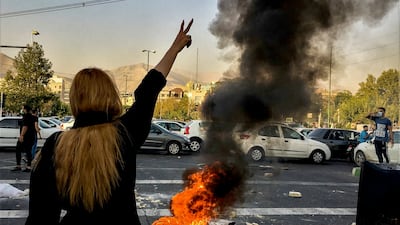More than 300 people were indicted on Monday for participating in Iran's women-led protests, with four possibly facing the death penalty, the country's judiciary said.
Protests against the Iranian regime turned violent at the weekend at Tehran's Sharif University of Technology, when a group of demonstrating female students clashed with counter-protesters.
The violence comes amid weeks-long anti-government protests triggered by the death of 22-year-old Mahsa Amini in morality police custody.
Indictments have been issued for 315 people for “congregating and colluding with the intention of acting against the country's security”, “propaganda against the system” and “disturbing public order”, the judiciary's Mizan Online news website cited Tehran prosecutor Ali Salehi as saying.
Mr Salehi said “indictments were also issued for four rioters on charges of moharebeh” — or “war against God” — a charge that can carry a death sentence.
The rioters are accused of “using a weapon to terrorise the society and people, injuring security officers, setting fire to and destroying public and government property with the intent to disrupt the country's security and confronting the holy system of the Islamic Republic of Iran”, he said.
The development comes as Iran's “morality police” have been filmed beating protesters and firing shotguns into crowds.
Demonstrations around the world have been held in solidarity with Iran's protest movement, with marches taking place in New York, London and Berlin.
Rights groups said more than 200 people have been killed since the protests began as security forces clamp down on the largest anti-government movement since 2019, when more than 200 died in what is now referred to as Bloody November.
Classes at Sharif University of Technology were suspended and moved online earlier this month after clashes between students and security forces.
Tasnim news agency reported that when classes resumed on Saturday, “a number of female students entered the men's dining hall after removing their hijab”, breaching Iran's rules on gender segregation in some public spaces and mandatory headscarves for women.
On Sunday, another group of students “held a rally … protesting against the insults and desecration that had occurred at the university”, Tasnim said.
The students, who waved the Iranian flag, called on the university's administration “to deal with lawlessness and violation of norms” on its campus, the report said.
A separate group of students “chanted vulgar slogans, broke the door and windows of the dining hall and threw them towards the students inside”, Tasnim said. It added that “some students and university security personnel” were injured.
The news agency published a video purportedly showing students kicking the door to the dining hall as others blocked it from inside.
The university said on Sunday that it had barred entry to “a small number of students” over their role in “creating an uneasy atmosphere”, local media reported.
The students were “temporarily banned from attending the university for their own benefit and for the benefit of the university”, Shargh newspaper quoted the statement as saying.
On October 2, riot police confronted about 200 students who gathered at the university and chanted slogans against authorities, Mehr news agency reported.
The security forces used tear gas and paintballs, while police officers were armed with weapons that shoot non-lethal steel pellets, Mehr reported.
Deputy Interior Minister Majid Mirahmadi said on Saturday that protests in universities and elsewhere had subsided.
“There are various gatherings in some universities, which are decreasing every day, and the riots are going through their final days,” state news agency IRNA quoted Mr Mirahmadi as saying.







































































